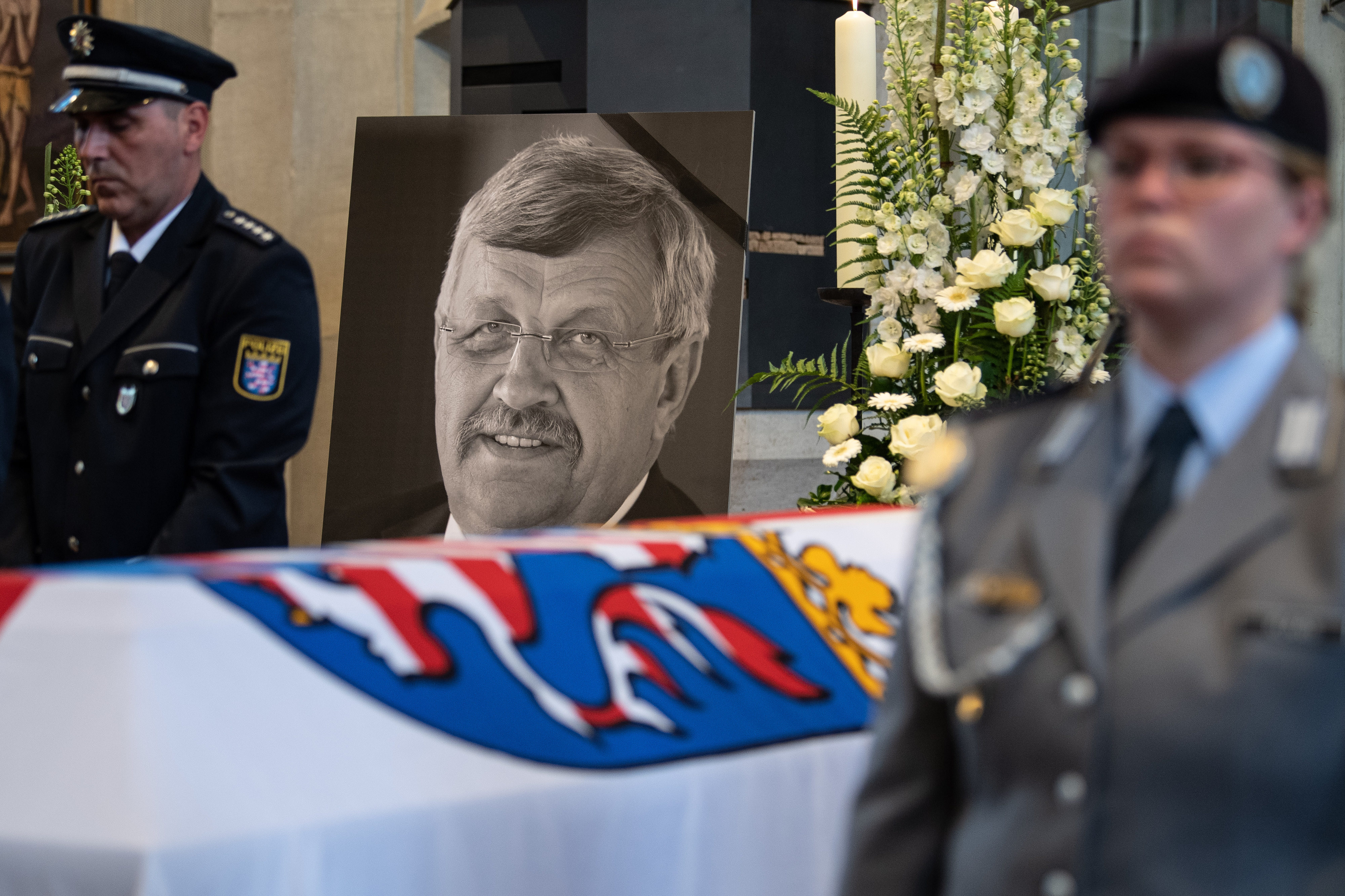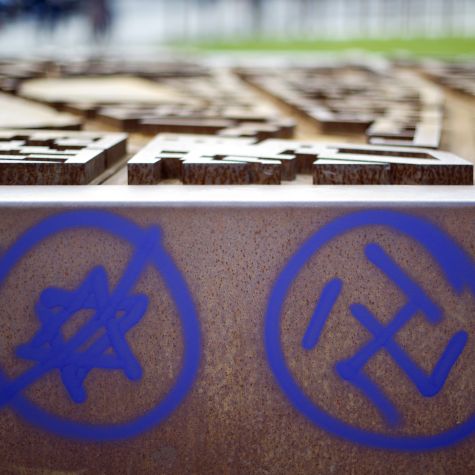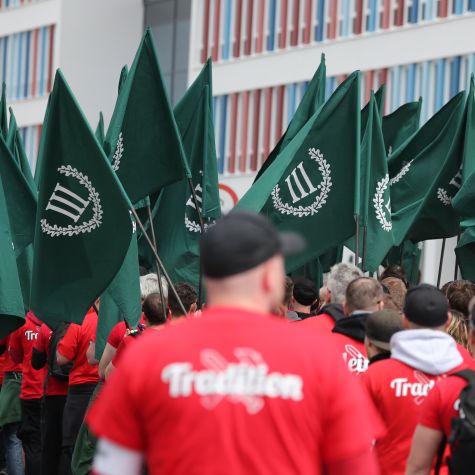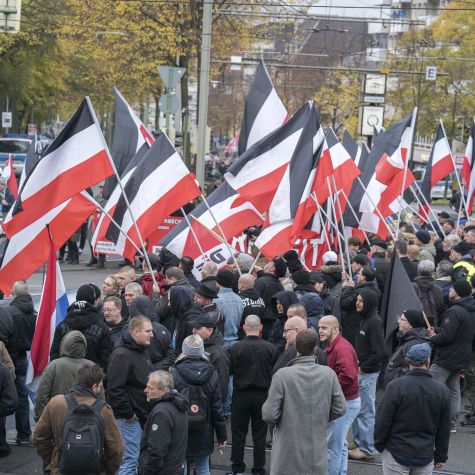Right-wing extremism

The field of right-wing extremism is characterised, to varying degrees, by elements of nationalist, antisemitic, racist and xenophobic ideology. Right-wing extremists allege that a person’s value is determined by the ethnic group or nation they belong to. This notion is fundamentally incompatible with the Basic Law.
Two essential elements of the neo-National Socialist ideology are nationalism and racism. Most German right-wing extremists downplay or even glorify National Socialism in particular. The latter is definitely true for neo-National Socialists (neo-Nazis), who take the Third Reich as a yardstick for their aims at political, economic and social level.
Antisemitism plays a central role for most right-wing extremists.
According to the International Holocaust Remembrance Alliance (IHRA), antisemitism can be defined as “a certain perception of Jews, which may be expressed as hatred towards Jews.
Rhetorical and physical manifestations of antisemitism are directed toward Jewish or non-Jewish individuals and/or their property, toward Jewish community institutions and religious facilities.”
Antisemitism is expressed in various ways, for example through the idea of a worldwide secret conspiracy of Jews or by holding Jews collectively accountable for the actions of the State of Israel.
In addition to that, right-wing extremists usually believe in the concept of an authoritarian state, which often goes along with a rejection of the separation of powers that is typical of democracies. Referring to historical National Socialism, neo-Nazis call for a “Führerstaat” (“leader state”) in which all decisions are made by and all state power is concentrated in the hands of a single individual.
Right-wing extremist political parties
Just as the emphasis placed on each of the ideological elements varies, so do the organisational forms and ideologies of the different currents of German right-wing extremism. Right-wing extremist political parties have set themselves the goal of securing votes in local, state, federal and European elections and thus to gain influence in parliaments.
In Germany the parties Nationaldemokratische Partei Deutschlands (NPD, National-Democratic Party of Germany), DIE RECHTE (The Right) and Der III. Weg (The Third Way) work towards that goal. However, the election results of the last few years have shown that voter support for right-wing extremist parties remains low and that electoral successes are isolated at best. Hence, for some time, all three parties have in fact been of relevance only within the scene itself. The privileged status of political parties makes it more difficult to ban them than other associations; this is also a reason why the scene uses this organisational form.
Neo-Nazis
The term “neo-nazis” refers to adherents of an ideological strand within right-wing extremism that is guided by historical National Socialism.
The latter constitutes the basis and general norm of neo-Nazi ideology, which is characterised by racism, antisemitism, nationalism and anti-pluralism.
Neo-Nazis strive for an authoritarian state based on the “Führerprinzip” (“leader principle”). Historical facts are given a new interpretation along revisionist lines; this may go as far as denying the Holocaust.
Party structures have been an umbrella under which neo-Nazis gather too, especially since several “comradeships” were banned between 2012 and 2014. In the parties DIE RECHTE and Der III. Weg, in particular, neo-Nazis continue their earlier activities.
Still, most neo-Nazis are not organised in political parties, but in associations or “comradeships”, which are largely structureless and have only a few officials.
Subculture-oriented right-wing extremists
In terms of quantity, subculture-oriented right-wing extremists represent an important spectrum of German right-wing extremism. They are not usually organised, but define themselves by a specific appearance, specific clothing and their musical preferences.
Until the 2000s approximately, right-wing extremist skinheads made up the largest part of that group. Today, its members are much more diverse, both in appearance and regarding their musical preferences.
What has remained unchanged, however, is that activities of an event-like character are particularly important to subculture-oriented right-wing extremists. This includes relevant music and martial arts events, for example, which scene members use to establish and maintain contact with one another.
Right-wing extremist music and music events are of major importance to the right-wing extremist scene. Music events in particular create a feeling of identity, community and strength among young scene members. In addition, the lyrics of the songs serve to spread and reinforce right-wing extremist views, enemy images and ideological fragments.
Like the consumption of right-wing extremist music and the attendance of related events, martial arts and large-scale martial arts events create a sense of identity and have become an increasingly important part of right-wing extremist event culture.
Within the right-wing extremist scene, martial arts bring together individuals of the subculture-oriented and of the neo-Nazi spectrum, members of right-wing extremist parties as well as hooligans and biker gang members sharing right-wing extremist attitudes, regardless of their organisational affiliation or of any existing conflicts and rivalries.
Other right-wing extremists
In addition to right-wing extremist parties, neo-Nazis and the subculture-oriented spectrum, there are other segments where right-wing extremists are active, including parts of the New Right.
One of the associations within this spectrum is the Identitäre Bewegung Deutschland e.V. (IBD, Identitarian Movement of Germany).
After emerging as a purely virtual group on the Internet in 2012, the association later came to attention through high-profile flash mobs and banner-waving activities. By now it is active throughout Germany via regional sub-groups.
IBD is committed to the principle of ethnopluralism, which means that, in IBD’s view, the ideal state and social order is an ethnically and culturally homogeneous state. This ideology violates the principles of human dignity and democracy, protected by the Basic Law, when it comes to citizens who do not fit this picture. Consequently, this ideology is incompatible with the Basic Law.
The association makes extensive use of social networks to spread reports, videos and pictures of its actions. For internal networking and communication, IBD members and sympathisers use messenger services.
Violence and right-wing terrorist acts
Violence is immanent in the right-wing extremist ideology. It does not only show in right-wing extremists’ spontaneous violent crimes, such as physical assaults on political opponents or immigrants, but has also manifested itself in several right-wing terrorist attacks, which were often planned well in advance and were aimed at intimidating potential victim groups. The attacks committed over the last few years usually involved the use of firearms, and the perpetrators primarily had xenophobic or antisemitic motives.

For instance, during the night of 1 to 2 June 2019, Dr Walter Lübcke, the chief official of the Kassel district, was shot on the terrace of his house in Wolfhagen (Hesse). This attack is considered the first assassination of a politician in Germany that was motivated by right-wing extremism.
The perpetrator Stephan Ernst, who had been active in several right-wing extremist organisations in the 1990s and 2000s, was given a life sentence on the charge of murder by the competent division of the Higher Regional Court of Frankfurt am Main on 28 January 2021. The division of the criminal court was convinced that Ernst acted alone in shooting Lübcke. The decision about placing him in preventive detention after his serving the sentence will be made by court order at the end of his time in prison. The Federal Public Prosecutor, as the competent prosecuting agency, has lodged an appeal against that judgment. So has Ernst.
On 9 October 2019 Stephan Balliet, who had not come to notice through right-wing extremist activities before, tried to force his way into a synagogue in Halle (Saxony-Anhalt). Several dozen people of Jewish faith were in the synagogue on the occasion of the most important Jewish holiday Yom Kippur. The perpetrator, with his self-built firearms and explosive devices, did not succeed in breaking through the security door of the synagogue.
Balliet killed a woman who happened to pass by on the street in front of the synagogue through several shots to her back. After his attack failed, he drove aimlessly through Halle in his car before finally stopping at a kebab restaurant. He entered and attacked the people there, who he thought were foreigners, shooting one of them dead. During his flight, the perpetrator tried to obtain a new vehicle by force and in doing so shot at two people, who incurred serious injuries. As he continued his flight, he caused a traffic accident after which he was caught by the police. Before his crime, the perpetrator had published documents online containing antisemitic and anti-Muslim ideology.
On 21 December 2020 the Higher Regional Court of Naumburg (Saxony-Anhalt) sentenced Balliet to life imprisonment.
He was found guilty, among other things, of murder in two cases, attempted murder in more than 60 cases, especially serious extortion with use of force and incitement to hatred.
Furthermore, the court ruled that there was a “particular severity of guilt” and ordered preventive detention. A psychological expert opinion had found that Balliet, although suffering from a complex personality disorder, was fully criminally responsible. With the defendant having refrained from lodging an appeal, his conviction is final.
At several places in Hanau (Hesse) on 19 February 2020, a 43-year-old man shot and killed nine people with a migrant background whom he had chosen at random. Then he killed his mother and himself. Five more people were injured in the attack, two of them seriously. The attacker was previously unknown to the German domestic intelligence services. The text files that the perpetrator had posted on the Internet suggested a mental illness and a world view with a right-wing extremist tendency. His choice of victims indicates that his crime was motivated by group-related misanthropy.
The attacks of Wolfhagen, Halle and Hanau show that right-wing terrorist attackers can become radicalised on the fringes or outside of the right-wing extremist scene too. The murderer of the chief official of the Kassel district had not come to the police’s notice or to that of the domestic intelligence services any more for a number of years; this is an example of the difficulties that the security agencies face in countering this new threat emanating from right-wing extremist terrorism.
It will remain a challenge to detect any potential perpetrators in advance of a planned attack if they move outside right-wing extremist structures and organisations and if the radicalisation of such individuals does not become obvious by relevant statements, activities or offences.
Additionally, the right-wing terrorist crimes described above, all of which were committed using firearms, underline the potential threat posed by right-wing extremists possessing weapons. Together with the other German security agencies, the German domestic intelligence services help identify right-wing extremists holding weapons permits and work towards the withdrawal, by the weapons authorities, of both such permits and the associated weapons.






